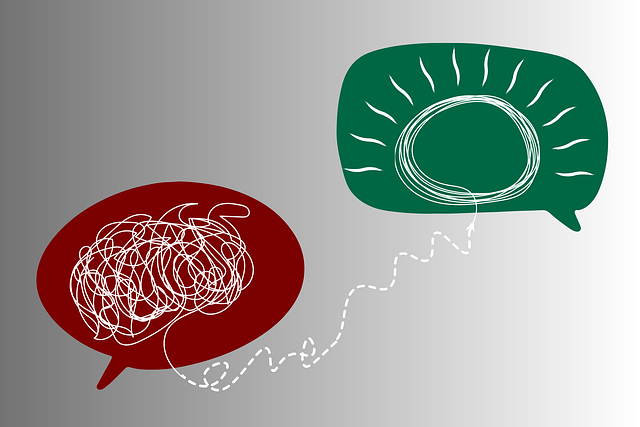Emotional Intelligence (EI) is a valuable asset in modern stressful environments, facilitating healthier relationships, better decision-making, and improved mental wellness. Littleton Biofeedback Therapy is an innovative approach to enhance EI through biofeedback techniques, offering real-time data on physiological changes to better understand and manage emotions. This therapy complements mindfulness practices and crisis intervention guidance, promoting stress reduction, emotional resilience, and self-care routines for overall well-being. By cultivating self-awareness, individuals can move from impulsive reactions to conscious decision-making, improving communication, connections, and self-esteem. Training healthcare providers and raising public awareness about EI, such as through Littleton Biofeedback Therapy, contributes to better social interactions and overall well-being. Integrating mindfulness and self-awareness into daily life is key for navigating challenges with equanimity and adaptability.
Emotional intelligence (EQ) is a powerful tool for personal and professional growth, enabling individuals to understand and manage their emotions effectively. This article explores the multifaceted benefits of EQ, delving into how Littleton Biofeedback Therapy facilitates its development. We’ll uncover practical strategies for enhancing self-awareness, improving social skills, and integrating emotional intelligence into daily life. By the end, you’ll grasp why cultivating EQ is a game-changer in today’s fast-paced world.
- Understanding Emotional Intelligence and its Benefits
- The Role of Littleton Biofeedback Therapy in EQ Development
- Practical Strategies for Enhancing Self-Awareness
- Improving Social Skills through Emotional Intelligence
- Integrating Emotional Intelligence into Daily Life
Understanding Emotional Intelligence and its Benefits

Emotional intelligence (EI) refers to an individual’s ability to recognize, understand, and manage their own emotions as well as recognize, interpret, and influence the emotions of others. This skill set goes beyond mere empathy; it involves effectively communicating feelings, building strong relationships, and making thoughtful decisions in response to emotional cues. By developing EI, individuals can enhance their personal and professional lives, fostering healthier connections and improving overall mental wellness.
In today’s fast-paced world, where stress and mental illness stigma reduction efforts are on the rise, cultivating compassion through practices like Littleton Biofeedback Therapy and other mindfulness techniques can play a pivotal role. Such approaches not only help in managing emotional responses but also promote self-awareness and empathy, crucial aspects of EI. This, in turn, contributes to better conflict resolution, improved leadership skills, and enhanced overall mental health, making it an invaluable asset for individuals navigating personal and professional challenges.
The Role of Littleton Biofeedback Therapy in EQ Development

Littleton Biofeedback Therapy plays a pivotal role in enhancing Emotional Intelligence (EQ). This therapeutic approach utilizes biofeedback techniques to help individuals gain profound insights into their emotional responses, enabling them to manage and regulate their emotions more effectively. By providing real-time data on physiological changes during various activities or stressful situations, biofeedback allows clients to establish a stronger connection between their thoughts, feelings, and bodily sensations.
This deeper understanding facilitates the development of essential EQ components like self-awareness, self-regulation, and empathy. Moreover, Littleton Biofeedback Therapy complements other compassion cultivation practices and crisis intervention guidance by offering practical tools for stress reduction and mental health improvement. It encourages individuals to integrate mindfulness into their daily lives, fostering a sense of calm and emotional resilience, which is crucial for maintaining balanced relationships and navigating life’s challenges with greater ease. Additionally, it supports the establishment of a consistent self-care routine, enhancing overall well-being and contributing to better mental health outcomes.
Practical Strategies for Enhancing Self-Awareness

Building emotional intelligence (EI) is a journey that begins with self-awareness—a cornerstone of what many refer to as Littleton Biofeedback Therapy. Self-awareness involves recognizing and understanding your emotions, thoughts, and behaviors in any given moment. It’s about becoming attuned to the subtle cues your body sends you, enabling you to make conscious choices rather than reacting impulsively.
Practical strategies to enhance self-awareness include mindfulness practices like meditation and deep breathing exercises. Keeping a journal can also help individuals track their emotions over time, identify patterns, and gain valuable insights into their inner world. Through these techniques, one fosters inner strength development and improves their ability to manage stress, which is key in promoting emotional well-being. Additionally, focusing on self-awareness lays the foundation for better communication, deeper connections, and enhanced self-esteem improvement, ultimately contributing to a more fulfilling life.
Improving Social Skills through Emotional Intelligence

Improving Social Skills through Emotional Intelligence is a vital aspect of personal growth and can significantly enhance our interactions with others. Emotional intelligence (EI) plays a pivotal role in fostering meaningful relationships and effective communication. By cultivating EI, individuals can develop superior social skills that lead to more fulfilling connections and improved overall well-being.
Littleton Biofeedback Therapy offers innovative techniques, including Self-Awareness Exercises, to help people understand and manage their emotions. These exercises empower individuals to recognize and regulate their feelings, thereby enhancing their ability to connect with others on a deeper level. Additionally, Healthcare Provider Cultural Competency Training and Public Awareness Campaigns Development can contribute to widespread social skill improvement by equipping professionals with the tools to navigate diverse cultural contexts sensitively and effectively.
Integrating Emotional Intelligence into Daily Life

Integrating Emotional Intelligence into Daily Life involves a mindful shift towards recognizing and understanding our own emotions, as well as those around us. This process begins with self-awareness—a cornerstone of emotional intelligence that empowers individuals to identify their feelings and reactions in various situations. Techniques like Littleton Biofeedback Therapy can play a pivotal role in enhancing this awareness by providing valuable tools for monitoring physiological responses to stress or emotional stimuli.
By regularly practicing mindfulness, meditation, and engaging in open conversations about emotions, individuals can foster better connections with themselves and others. This fosters an environment conducive to burnout prevention and crisis intervention guidance. Moreover, cultivating emotional intelligence strengthens resilience building, enabling individuals to navigate challenging situations with greater equanimity and adaptability.
Emotional intelligence, a powerful tool for personal and professional growth, can be cultivated through various means. As discussed, understanding EQ’s benefits is the first step. Littleton Biofeedback Therapy offers a unique approach to enhance self-awareness and emotional control. Practical strategies, such as mindfulness exercises, facilitate self-reflection and understanding. Social skills, crucial for effective communication, can be significantly improved by incorporating EQ into daily interactions. By integrating these concepts into our lives, we not only improve relationships but also foster a more balanced and fulfilling existence.














